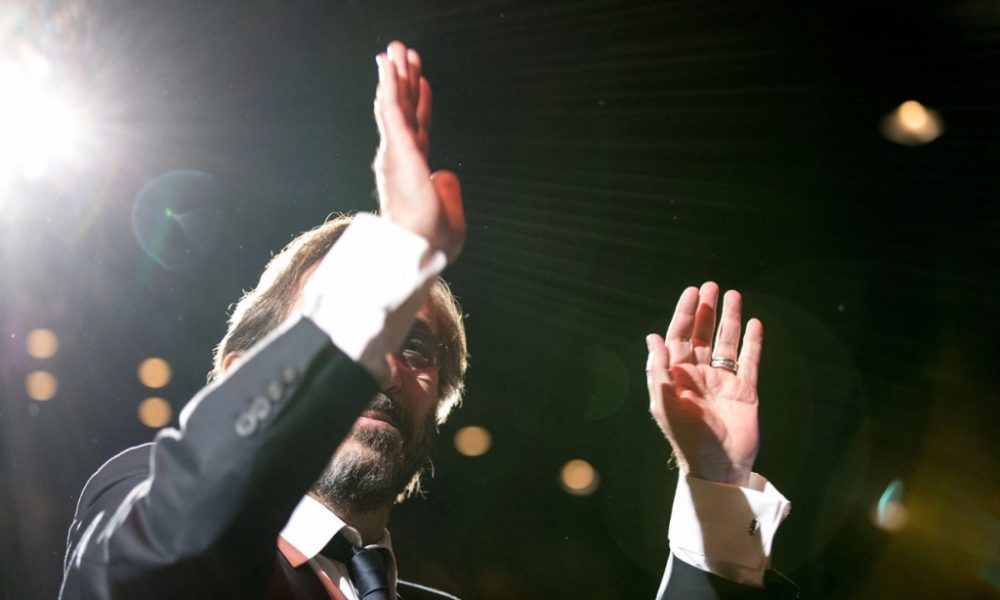Es war einmal in Deutschland (Bye Bye Germany): An interview with director Sam Garbarski

Audiences perhaps best know Sam Garbarski for his 2003 film Irina Palm, starring Marianne Faithful as a grandmother who uses her… um… palm to raise money for her sick grandson’s operation. His most recent feature is the bittersweet Es war einmal in Deutschland (Bye Bye Germany), adapted from a novel by the Swiss writer Michel Bergmann. It stars German superstar Moritz Bleibtreu as David, a Jewish peddler who tries to improve his fortunes after the Second World War, with honesty not being an obstacle. We met with Sam Garbarski at the 2017 Berlin International Festival to talk about his new film.
What made you want to adapt Michel Bergmann’s novel?
I loved the novels when I got them. It’s my pleasure to travel into the stories of others, and this is something I’ve done since I was a kid. It can be a painting, it can be a film, it can be a book, it can be a song. I get lost, and I imagine it was a story, and if I like it, it almost feels like my story. And it’s a matter that was taboo in my family. After the war, the Jews in Germany just didn’t talk about it, and there was always the question, Why did you stay? So I had the occasion to ask, like analysing, getting into a subject that was never treated in my life.
Is cinema good for self-analysis in this way?
I can only make cinema. If I could paint something, I would maybe make a painting. Cinema is a way of expressing yourself and treating matters, which sometimes goes further than necessary, but on the other hand, it’s very popular.
Why do you think the subject of Jewish people who stayed in Germany after the war has so rarely been explored, or even spoken about?
They felt guilty. You know, survivor guilt, huh? They feel guilty because they survived and they felt guilty because they stayed. But I didn’t want to dig too much into that. I was not the only one whose family didn’t talk about it – also Michel who wrote the book – and there were some exceptions, but mostly families didn’t talk about it.
Why do you think that some Jewish people opted not to say Bye Bye Germany, and stayed, instead of joining the mass exodus to America?
I sort of gave an answer in the movie. It’s at the end when David says that they can’t leave this beautiful country to the Germans. But they (the Jewish population) were more German than the Germans, or at least as German as the Germans. And it’s not even because of this (WW2) that they didn’t feel German anymore. And so some wanted to stay. He states it in a very funny way, in an amusing way, and earlier he had mentioned that if he didn’t know how to tell jokes, he would be dead already. So this is a nice way of showing how he could survive. Of how one could survive. Because it’s a story of one person, who is part of the bigger story, but it’s still just one man’s story. You could have taken five people, but that would have been an ensemble film. And in a way it is, but I still say that this is David’s story, and he and the group are all part of the bigger story. And I like that when I read a book: a smaller story that is really part of a bigger story.
Do you think the humour in the film is stereotypically Jewish?
I’m Jewish and Jewish humour is more philosophical than funny. Self irony for me is… my only quality. I don’t have many, but I don’t take myself seriously. I laugh at myself, and people can make fun of me, and I don’t feel bad. I can live with it if people make fun. I’m not a bad loser. It’s something I do naturally, and I put a little of this into David. Of course when you make a film you put a little bit of yourself into the characters.
David tells jokes and funny stories to keep himself alive. Could you do the same, and did anything funny happen on the shoot?
We were supposed to shoot six months earlier, and the day before the shoot was to start I left a train station, missed one step, and tore my… quadriceps? That thing in your leg. And then there was the hospital and an operation, but they were all waiting – I don’t know how many people were waiting for me on set. I was supposed to give my opening speech, but of course everything had to be pushed back by six months. I woke up from the anaesthesia, and a guy from the film insurance company called me – they put him through, I don’t know how – and he said, Mr Gabarski, can you imagine shooting this film on a rolling hospital bed with a specialist taking care of you? And I said, I’m just waking up, and asked if it was serious or someone making a joke. But in all seriousness, they wanted me to shoot the movie from a bed on rollers. I think this guy had never been on a set before…
Oliver Johnston
Read our review for Es war einmal in Deutschland (Bye Bye Germany) here.
For further information about the 67th Berlin Film Festival visit here.
Read more reviews from the festival here.
Watch the trailer for Es war einmal in Deutschland (Bye Bye Germany) here:



























Facebook
Twitter
Instagram
YouTube
RSS